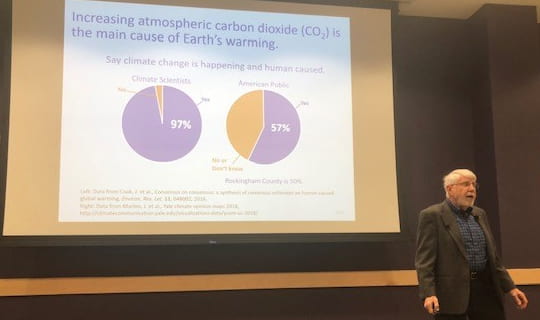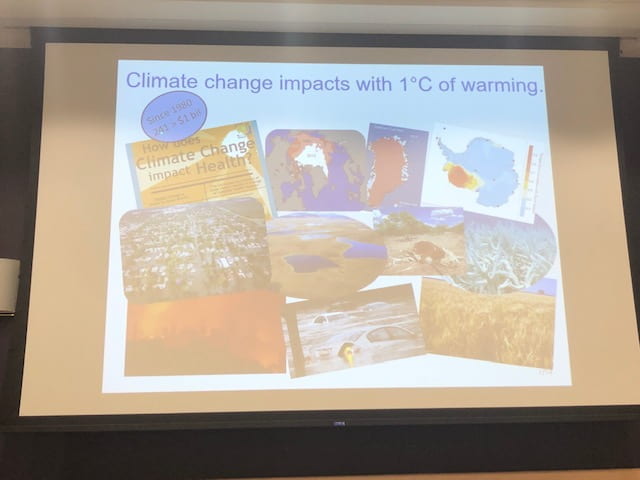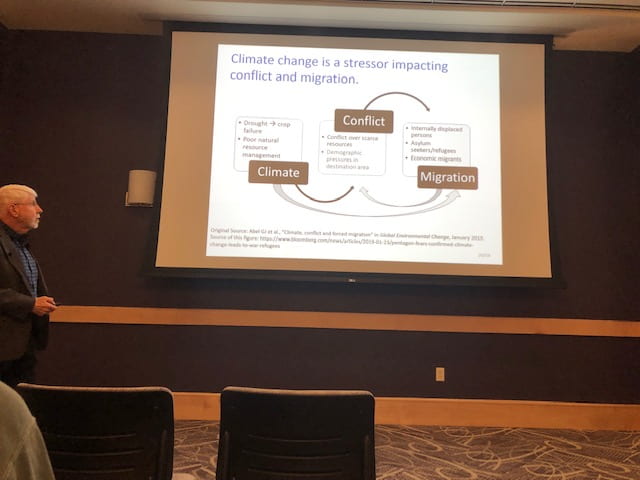Post by Julia Kravitz (JMU, ’19)
 In February, Democracy In Peril featured Dr. C.P. Leslie Grady Jr., who spoke about the devastating effects of this past century’s impacts on global climate and what is projected to happen if the world stays on its current course of carbon emissions. Dr. Grady began the talk on Climate Science: the Ghost of Christmas Future began with a quote A Christmas Carol by Charles Dickens where the Ghost of Christmas Yet to Come enlightens the terrified Ebenezer Scrooge that all hope is not yet lost, that the future is subject to change according to the actions he chooses to take in the present. Throughout his lecture, Dr. Grady related back to this quote hopeful that the planet is not too far gone, that there still is time to change the course of our future, but only if there are substantial and drastic changes to “business as usual.”
In February, Democracy In Peril featured Dr. C.P. Leslie Grady Jr., who spoke about the devastating effects of this past century’s impacts on global climate and what is projected to happen if the world stays on its current course of carbon emissions. Dr. Grady began the talk on Climate Science: the Ghost of Christmas Future began with a quote A Christmas Carol by Charles Dickens where the Ghost of Christmas Yet to Come enlightens the terrified Ebenezer Scrooge that all hope is not yet lost, that the future is subject to change according to the actions he chooses to take in the present. Throughout his lecture, Dr. Grady related back to this quote hopeful that the planet is not too far gone, that there still is time to change the course of our future, but only if there are substantial and drastic changes to “business as usual.”
 Dr. Grady detailed the extent to which human activities, such as carbon emissions and burning of fossil fuels, since the industrial period, 1880-1920, have altered the planet and has caused the global temperature to increase by 1℃. Although 1℃ may not seem to be alarming, considering the extreme weather we have been experiencing recently, the extent to which the polar ice caps are melting and the extent to which the global sea level is rising, this mere increase in temperature has caused a lot of chaos. The world temperature is steadily rising to 1.5℃, which, according to scientists all over the globe, is the highest temperature increase the planet can withstand before there is irreparable damage to the ecosystem and landscape.
Dr. Grady detailed the extent to which human activities, such as carbon emissions and burning of fossil fuels, since the industrial period, 1880-1920, have altered the planet and has caused the global temperature to increase by 1℃. Although 1℃ may not seem to be alarming, considering the extreme weather we have been experiencing recently, the extent to which the polar ice caps are melting and the extent to which the global sea level is rising, this mere increase in temperature has caused a lot of chaos. The world temperature is steadily rising to 1.5℃, which, according to scientists all over the globe, is the highest temperature increase the planet can withstand before there is irreparable damage to the ecosystem and landscape.
 Dr. Grady explained the implications that this increase would have on developing and vulnerable nations who are less equipped to combat the chaos that would ensue if the planet were to reach that point. Challenges include exacerbating political, economic and social conflict and instability. As UNESCO recently noted, “impacts are already contributing to increased state fragility and security problems in key regions around the world – conflict in the Middle East and Africa, tensions over fisheries in the South China Sea, and a new political and economic battleground in a melting Arctic Ocean.” Dr. Grady noted that continuing to burn fossil fuels increases the risks from sea level rise, high temperatures, changing precipitation patterns and extreme weather. These will increase global instability, putting democracy in peril worldwide.
Dr. Grady explained the implications that this increase would have on developing and vulnerable nations who are less equipped to combat the chaos that would ensue if the planet were to reach that point. Challenges include exacerbating political, economic and social conflict and instability. As UNESCO recently noted, “impacts are already contributing to increased state fragility and security problems in key regions around the world – conflict in the Middle East and Africa, tensions over fisheries in the South China Sea, and a new political and economic battleground in a melting Arctic Ocean.” Dr. Grady noted that continuing to burn fossil fuels increases the risks from sea level rise, high temperatures, changing precipitation patterns and extreme weather. These will increase global instability, putting democracy in peril worldwide.
Scientists have modeled all possible courses of action that need to be taken in order to slow down the rate at which the planet is warming and eventually reverse the trend, however that includes drastic changes and calls for alternative, reusable energy innovations that seem daunting. Replacing our existing energy infrastructure will be complicated and time consuming. Nevertheless, it is the least costly and most effective strategy. Dr. Grady emphasized that the longer we wait to stop using fossil fuels, the more disruptive the transition will be, the more serve climate change will become and the more it will cost to adapt to it.
Relating back to the Dickens quote in his concluding thoughts, Dr. Grady urged the audience to practice “active hope” as a requisite for solving the problem. He suggested doing whatever you are able to address this problem, whether it be eating less meat, minimizing driving and air travel, planting more trees, or reducing cognitive dissonance. While Dr. Grady urged individual actions are important for making our lives congruent with our values, he also noted that they are not as effective as changes in energy policy for slowing climate change. But he urged us as individuals to get involved at all levels of government to advocate and eventually implement a price on carbon.
There is no easy, simple or quick solution to the climate problem we are facing in our near future. However, our planet is not a lost cause.

Recent Comments